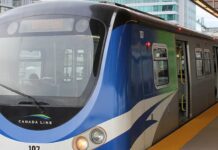 RESIDENTS of Metro Vancouver articulate one main concern following the defeat of the Yes side in the Transit and Transportation Plebiscite, a new Insights West poll has found.
RESIDENTS of Metro Vancouver articulate one main concern following the defeat of the Yes side in the Transit and Transportation Plebiscite, a new Insights West poll has found.
The online survey of a representative sample of Metro Vancouver residents shows that 62% believe the most pressing transportation concern is reforming the way TransLink operates.
Just 22% of Metro Vancouverites think ensuring funding for projects from the federal and provincial governments is a more important issue, while 16% would concentrate on coming up with a Plan B to deliver the proposed infrastructure projects.
“This is an issue where Yes and No voters are in agreement,” says Mario Canseco, Vice President, Public Affairs, at Insights West. “Three-in-five residents believe that major changes are required at TransLink, before we start to figure out how the transportation projects are going to be funded.”
Insights West tracked the perceptions of the public on this plebiscite since December 2014, and up to a few days before ballots were mailed to households. While Metro Vancouverites appeared supportive of the Yes side at the end of 2014, they began to move towards the No side in 2015, and a majority stayed there until they mailed their ballots.
When asked who they blame for the defeat of the Yes side, more than half of Metro Vancouverites (54%) point the finger primarily at TransLink. Significantly fewer residents believe the “No” campaign organizers (17%), BC Premier Christy Clark (14%), the “Yes” campaign organizers (8%) and the mayors who supported the “Yes” side (7%) are mainly responsible for the result.
Motivations of NO voters
Three-in-four No voters (76%) said they did not have confidence in TransLink to implement transportation projects properly, and more than half (53%) did not trust the Mayors to make the best funding decisions. Two-thirds of No voters also expected the proposed 0.5% tax to be higher in the future (68%) and urged TransLink to explain how funds are spent before residents vote on any tax increase (67%).
One-in-five No voters (21%) said they considered voting Yes at one point, but decided against it. Almost half (46%) say they are sending a message to TransLink and the Mayors with their ballot.
Motivations of YES voters
Seven-in-ten Yes voters (72%) said that, while they were dissatisfied with TransLink’s performance, they cast their ballot because they saw the plebiscite as the best way to deal with current and future transit problems. A majority of Yes voters (56%) also felt that the plebiscite addresses the traffic, services and roads problems we have in the Lower Mainland, and 43% thought having annual independent audits and public reporting would promote transparency.
Three-in-ten Yes voters (29%) said that at one point they thought about voting No, but changed their mind. It is important to note that Yes voters expressed particularly low levels of confidence in TransLink (13%) and the Mayors (17%).
The Future
Metro Vancouverites were also asked to assess TransLink and its future. Fewer than one-in-five residents expect TransLink to be better at providing a variety of services for commuters (18%), accountability (16%), efficiency (15%) and quality (11%). Yes voters expect TransLink to be better in these four categories, while No voters predict that the current conditions will actually worsen.












